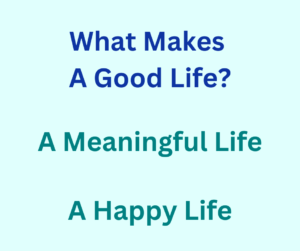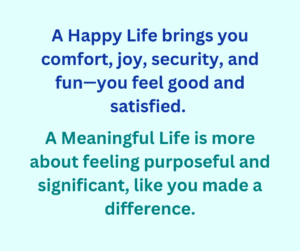
How could our objectives and daily choices transform if we reconsidered well-being from fresh perspectives? What potential advantages might emerge in both our personal lives and within our communities? Consider the following novel concepts regarding happiness and well-being for contemplation in your own journey:
- Enriched Psychological Experience: When contemplating a fulfilling life, positive psychology has traditionally focused on two main avenues: a contented life characterized by happiness, or a meaningful life defined by a sense of purpose. A contented life brings comfort, joy, security, and amusement, resulting in a satisfying state. Conversely, a meaningful life is typified by a feeling of significance and the impression of making a meaningful impact. Typically, our lives encompass a blend of these two dimensions, with individuals often prioritizing one over the other. However, Shigehiro Oishi, a researcher at the University of Virginia, probed further and posed an intriguing question: Is there a third form of a fulfilling life that isn’t solely determined by happiness or meaning? Oishi’s curiosity was aroused by perplexing findings, such as research suggesting that conservatives and individuals with narrower social networks on platforms like Facebook tend to experience greater happiness. Could this imply that liberal thinking and diverse connections do not lead to a rewarding life? His exploration led him to the concept of a psychologically rich life—an existence defined by curiosity, novelty, variety, openness, adventure, and exploration. The psychological richness of our lives expands through studying abroad, immersing ourselves in specific types of literature, altering our perspectives, and undergoing transformative life events. An existence marked by psychological richness implies having encountered a breadth of experiences and knowledge. To embrace this path toward a fulfilling life, consider infusing your routine with spontaneity and playfulness. Engage in novel activities, pursue new areas of learning, and remain open to the directions they might lead. While happiness and meaning may fluctuate in response to life’s ups and downs, psychological richness can gradually accumulate through the accumulation of new experiences over time.

- Equilibrium and Serenity: Each year, the Gallup World Poll surveys individuals from over 150 countries about their well-being, inquiring about their satisfaction with life and whether they experienced moments of joy, laughter, or contentment the previous day. Implicit in these inquiries is a specific perception of well-being, which is also mirrored in the advice often dispensed by the media on how to attain happiness. This perspective revolves around a spirited happiness characterized by excitement, enthusiasm, and elation. However, a group of researchers is endeavoring to explore and elevate an alternative facet of happiness that has received relatively limited attention in well-being research: the tranquil emotions of calm, equilibrium, and harmony. Since 2020, the Global Well-Being Initiative has collaborated with Gallup to gauge individuals’ daily sensations of tranquility, contentment, peace, balance, and harmony. This exploration has yielded intriguing insights. For instance, when people across the world are asked whether they would prefer a life filled with excitement or a life of tranquility, a majority express a preference for the latter. Although this concept of calm is influenced by Eastern notions of well-being, it resonates globally. Additionally, individuals who experience heightened balance, harmony, and peace tend to report greater life satisfaction. What implications does this hold for us? If you aspire to cultivate more tranquility, research suggests that such a state is often discovered in the present moment—through mindfulness practice or by recognizing the aspects of your current life that you appreciate. This endeavor might also entail embracing negative emotions as integral components of the diverse human experience.

- Cultural Identity and Bond: While there’s much wisdom to glean from cultures worldwide about the constituents of a rewarding life, it’s imperative not to disregard our own cultural heritage. Recent research increasingly highlights the value of participating in cultural traditions and fostering connections with our cultural identity as potent avenues to well-being. Engaging in activities such as passing down knowledge to younger generations, community involvement, participation in cultural events, and nurturing a robust sense of identity and self-worth are pivotal in enhancing well-being. Insights from studies in this realm remind us that a singular, universally defined path to a fulfilled and content life does not exist. Our capacity to learn and grow expands when we remain open and curious, allowing us to explore diverse routes to happiness and fulfillment.